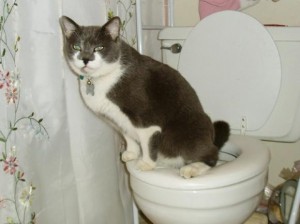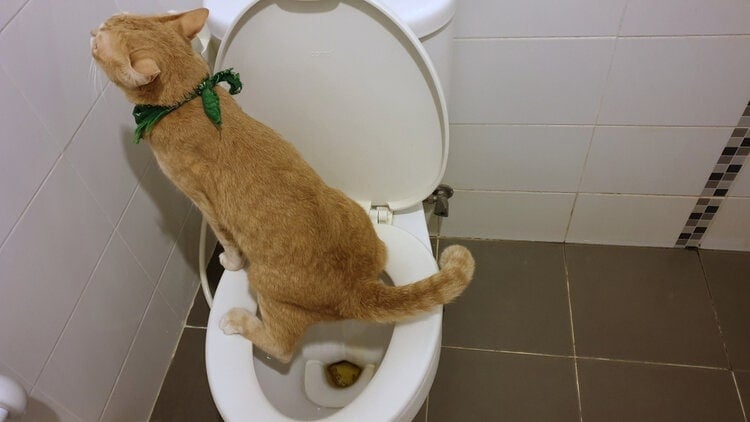Avoid Bathroom Emergencies: Don't Flush Cat Poop Down Your Toilet - Professional Advice
Avoid Bathroom Emergencies: Don't Flush Cat Poop Down Your Toilet - Professional Advice
Blog Article
Presented here in the next paragraph you might get lots of great facts on the subject of Can You Flush Cat Poo or Litter Down the Toilet?.

Intro
As feline proprietors, it's vital to be mindful of how we dispose of our feline friends' waste. While it might seem hassle-free to purge cat poop down the commode, this method can have detrimental effects for both the atmosphere and human health and wellness.
Alternatives to Flushing
Thankfully, there are much safer and more liable methods to throw away feline poop. Think about the complying with choices:
1. Scoop and Dispose in Trash
One of the most typical method of taking care of cat poop is to scoop it right into a naturally degradable bag and toss it in the trash. Be sure to utilize a devoted clutter inside story and take care of the waste immediately.
2. Usage Biodegradable Litter
Select eco-friendly pet cat clutter made from products such as corn or wheat. These clutters are environmentally friendly and can be safely disposed of in the trash.
3. Bury in the Yard
If you have a lawn, think about burying cat waste in a marked area far from veggie gardens and water sources. Make certain to dig deep enough to avoid contamination of groundwater.
4. Set Up a Pet Waste Disposal System
Invest in an animal garbage disposal system especially created for pet cat waste. These systems utilize enzymes to break down the waste, lowering odor and environmental influence.
Health Risks
In addition to ecological problems, purging cat waste can also present wellness risks to people. Pet cat feces may include Toxoplasma gondii, a bloodsucker that can cause toxoplasmosis-- a potentially extreme health problem, especially for expecting females and individuals with weakened immune systems.
Ecological Impact
Purging feline poop presents harmful microorganisms and bloodsuckers right into the supply of water, posturing a significant threat to marine environments. These impurities can negatively affect aquatic life and compromise water top quality.
Final thought
Liable animal possession extends beyond offering food and shelter-- it likewise entails correct waste monitoring. By refraining from flushing cat poop down the toilet and going with different disposal approaches, we can minimize our environmental footprint and protect human health.
Why You Should Never Flush Cat Poop Down the Toilet
A rose by any other name might smell as sweet, but not all poop is created equal. Toilets, and our sewage systems, are designed for human excrement, not animal waste. It might seem like it couldn’t hurt to toss cat feces into the loo, but it’s not a good idea to flush cat poop in the toilet.
First and foremost, assuming your cat uses a litter box, any waste is going to have litter on it. And even the smallest amount of litter can wreak havoc on plumbing.
Over time, small amounts build up, filling up your septic system. Most litter sold today is clumping; it is made from a type of clay that hardens when it gets wet. Ever tried to scrape old clumps from the bottom of a litter box? You know just how cement-hard it can get!
Now imagine just a small clump of that stuck in your pipes. A simple de-clogger like Drano isn’t going to cut it. And that means it’s going to cost you big time to fix it.
Parasitic Contamination
Believe it or not, your healthy kitty may be harboring a nasty parasite. Only cats excrete Toxoplasma in their feces. Yet it rarely causes serious health issues in the cats that are infected. Most people will be fine too if infected. Only pregnant women and people with compromised immune systems are at risk. (If you’ve ever heard how women who are expecting are excused from litter cleaning duty, Toxoplasma is why.)
But other animals may have a problem if infected with the parasite. And human water treatment systems aren’t designed to handle it. As a result, the systems don’t remove the parasite before discharging wastewater into local waterways. Fish, shellfish, and other marine life — otters in particular — are susceptible to toxoplasma. If exposed, most will end up with brain damage and many will die.
Depending on the species of fish, they may end up on someone’s fish hook and, ultimately on someone’s dinner plate. If that someone has a chronic illness, they’re at risk.
Skip the Toilet Training
We know there are folks out there who like to toilet train their cats. And we give them props, it takes a lot of work. But thanks to the toxoplasma, it’s not a good idea.

I came across that blog posting on How to Dispose of Cat Poop and Litter Without Plastic Bags while scouting around the web. Don't hesitate to set aside a second to distribute this blog post if you enjoyed it. Thank you for your time invested reading it.
Contact Us Today Report this page